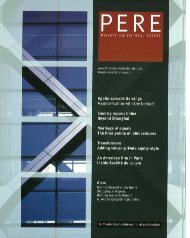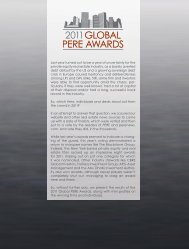2010AWARDS & AnnuAL REVIEW - PERE
2010AWARDS & AnnuAL REVIEW - PERE
2010AWARDS & AnnuAL REVIEW - PERE
You also want an ePaper? Increase the reach of your titles
YUMPU automatically turns print PDFs into web optimized ePapers that Google loves.
seas real estate and had been largely choosing non-listed vehicles<br />
to do it through. When it came to real estate in their own backyard,<br />
though, the same pension managers were thinking about<br />
going direct or through joint ventures over the next few years.<br />
In contrast, some large continental European investors in<br />
unlisted property funds were retrenching, rather than pursuing<br />
pan-European fund investments. Having suffered as a result of<br />
diversification, lack of control and poor performance, investors<br />
such as the Italian insurance company Generali were scaling<br />
back on commitments to the unlisted sector.<br />
Sovereign wealth funds – a real presence in European unlisted<br />
funds – also were said to be looking to buy property more<br />
directly and in club structures with like-minded investors.<br />
All of this is before one looked at another investor sub-set<br />
such as the high- and ultra-high-net-worth individuals. This<br />
type of investor, also at MIPIM, is a fast moving and more fickle<br />
animal than pension funds and insurance companies, not being<br />
hampered with having to meet liabilities.<br />
Against this backdrop, there was a vast number of different<br />
GPs from different parts of the globe all wanting to attract equity<br />
commitments from investors. No wonder the delegates and<br />
residents of Cannes were strange bedfellows.<br />
A matter of trust and expenses<br />
Management fees were a hot topic in europe<br />
just as they were in the us and elsewhere<br />
Every now and again, an elite club of European private equity<br />
real estate fund managers meets informally in central London<br />
to chew the fat. What is discussed behind closed doors reflects<br />
the big issues of the day, and one item that certainly was on<br />
the agenda in 2010 was just how much GPs should push back<br />
against LPs on the issue of fees.<br />
It was a crucial topic because, as stated in a report by INREV,<br />
the management of management fees and terms suggested<br />
many investors increasingly were in favour of upending the traditional<br />
fee structure in European funds. Specifically, LPs wanted<br />
change on both the management fee and performance fee.<br />
There are many aspects of a private equity real estate fund’s<br />
fee structure to consider. But on management fees specifically,<br />
the problem investors identified was in the way they had lurched<br />
away from being a way to pay overheads towards becoming a<br />
profit centre in their own right.<br />
That is rightly to be stamped upon. However, there is a danger<br />
in shifting too far on the issue.<br />
The case against low-balling the management fee is that, in<br />
certain circumstances, putting a premium on how low you can<br />
go on the management fee might persuade some managers to<br />
cut corners in managing optimally. Indeed, this might be the<br />
case if the investors come to expect a report on total expense<br />
ratio from funds. INREV’s study says total expense ratio currently<br />
is reported to investors by just 26 percent of funds that<br />
replied to INREV.<br />
The concept of working out and relaying how much money is<br />
not being spent on investment has its benefits in terms of being<br />
a worthwhile measure. But the total expense ratio doesn’t tell<br />
an investor everything it needs to know about the value of the<br />
management fee spend.<br />
The issue comes down to trust. LPs need to trust that a manager<br />
is not looking to make money out of a management fee,<br />
rather that it wants to spend for the greater good of the investor<br />
base. The trouble is that the bond of trust has been broken<br />
thanks to the mistakes made by many during the downturn.<br />
Spotlight on spin-outs<br />
A study suggested 43 percent of private equity<br />
GPs thought incentives were never greater to<br />
spin out, but in reality it was not that easy<br />
It is hard to gather cold hard facts, as opposed to anecdotal evidence,<br />
about how many GPs are contemplating spinning out. For<br />
example, one cannot look up an index to get the number in order<br />
to gauge its prevalence. So a study by accounting firm Grant<br />
Thornton certainly was welcome because at least it threw a spotlight<br />
on the thinking among UK GPs in mainstream private equity,<br />
which in turn is a rough guide for its cousins in real estate.<br />
In its UK private equity second quarter index, Grant Thornton<br />
put the following statement to GPs: “Incentives have never<br />
been greater for executives to leave their firms and set up a new<br />
fund.” On one level, the results were inconclusive: fifty-seven<br />
percent of GPs disagreed with the statement, while 43 percent<br />
agreed. Nevertheless, four out of 10 GPs did agree, and that’s<br />
quite a lot. It makes one wonder if we are not going to see a lot of<br />
spinouts in the next couple of years.<br />
Just as in mainstream private equity, plenty of real estate<br />
funds have been caught out in terms of spending capital at the<br />
height of the market. The issue they face now is how they can<br />
work through those assets and reward themselves and their<br />
staff.<br />
Adam Turner, head of executive search firm Odgers Berndston’s<br />
private equity practice in London, told <strong>PERE</strong>’s sister<br />
magazine Private Equity International that he was working on<br />
two mandates involving teams spinning out and setting up<br />
first-time funds. “A number of guys within the general partnerships<br />
are starting to look at each other and ask, ‘Am I going<br />
to have to work twice as hard, for twice as long to earn half as<br />
much money?’”<br />
Clearly, there are forces at work that can precipitate spinning<br />
out. In the case of DLJ Real Estate Capital Partners, some<br />
sources said it’s because parent company Credit Suisse seemed<br />
to want to exit the arena. Lehman Brothers also was a severe<br />
case of needing to do something with its platform.<br />
Of course, there are plenty of other factors that make such a<br />
thing tricky and time consuming. Issues pertaining to the GP<br />
and LP stake, third-party investors, lenders and joint venture<br />
partners can complicate transactions. Indeed, making a decision<br />
about one’s future is hard at the best of times, but it is especially<br />
difficult today.<br />
2010 AwArds & AnnuAl review | <strong>PERE</strong> 43







